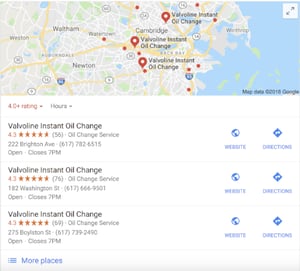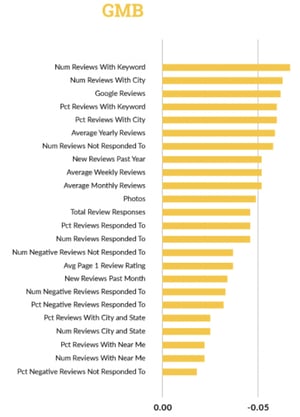Find out about the new duo on the SEO block for local businesses-customer reviews and Google My Business on our blog today.

By Matt Murray - Founder/CEO
We’re all taught the importance of “Please” and “Thank you” at an early age. Since before most of us could walk and talk our parents were helping us develop manners.
I can clearly remember drilling this concept into my daughter Harper roughly 97,340,309 times between the ages of two and five.
Generally it sounded something like “What’s the magic word?”.
Eventually we pick it up.
At eight years old, Harper nails it about 75% of the time and I’m pretty good with that.
In the business world, these manners are the foundation of customer service. “Good afternoon, this is Jody at Checkered Flag Toyota, how can I help you?” - some version of this plays out thousands of times a day across the country.
It’s the right thing to do and we train our teams to cover these basics from day one.
From our customer’s perspective - this is the cost of entry.
People want to feel acknowledged, appreciated and respected. However, the “thank you” game is changing with the advent of increased online retail activity, and the emergence of additional business review websites - many specific to a given industry.
There are measurable benefits to any local business, car dealers included, of saying thank you the right way.
We talk a lot about keyword strategies in digital marketing.
In SEO specifically, we focus on ensuring that we are using the name of our business, our products and services, and geographical locations we serve on our website.
This is good content for the reader and for the search engines - Google and others need to know who you want to come to your site.
There is a new player on the SEO block for local businesses, hidden in plain site on your Google My Business page - customer reviews.
Reviews aren’t just for the next prospect to get a pulse on the business or for the current customer to praise or criticize their experience - reviews fuel Google’s local search algorithms with the information needed to properly understand your business and direct traffic.
Let’s start with the below screen screenshot. This is a search for “best oil change Boston.”

We should bow our heads in a moment of silence for every dealer in Boston - not a single dealer above the “more places” link in this screenshot.
This is nothing new, we all know that we aren’t doing the best we can in digital marketing for the service department.
But look closer - you’ll notice that this search result has been auto-filtered by Google to only show businesses with a 4.0 star rating or higher.
What gives?
Simply - Google is interested in sending its searches to what it believes are the “best” businesses. Whether or not your online reputation is an accurate reflection of your store, this is all Google has to go on.
So - PSA #1 - if your store has a Google rating below 4.0 - time to get to work (surprisingly, this applies to roughly 25% of dealers!). By the way, try this type of search for almost any service - “best dentist Minneapolis” or “best restaurant Chicago”.
In many cases, depending on where you live, “best car dealership near me” will return a similar, filtered result.
Looking deeper, we find that review content and responses play a significant role in ranking.
Search Engine Journal released an article with research showing that reviews were the most prominent local SEO ranking factor in 2017. If that doesn’t make you sit up a bit in your chair, keep reading.

The research focused on many key areas of these reviews - quality, frequency, and volume of reviews to start. Then keyword usage, percentage of reviews responded to, and keywords in those responses.
Check out the source research from Local SEO Guide here.
Not only does it support a review-driven strategy, it clearly shows that engaged businesses who know how to respond to reviews will be rewarded.
But rewarded with what?
The SEO experts are pointing to reviews as a potential replacement for link-building strategies. I’m not ready to jump in with both feet on that, yet.
Generally - covering all of your bases is the most sound strategy and dealers shouldn’t disregard link building as a way to increase page rank and site authority. But - it’s hard to ignore the impact of reviews and responses on search rank.
In most cases, traffic from Google (all traffic from Google) is around 60% or more of a site’s total traffic volume.
If you’re able to split out referrals from the GMB (which you should be able to, if not, time to get tagging), take a look at the performance of that traffic.
Low bounce rates and high conversion rates are very typical. In fact, this may be your best performing source of traffic, especially if you've prioritized Google My Business optimization.
You’re simply not getting enough of it.
Think about the GMB as another website for your business - feed it content and it will reward you. Today, the GMB shows in 93% of local searches, it just can’t be ignored.
We now know that reviews are a great source of content for the GMB, but let’s focus in on the responses.
Harvard Business Reviews released a paper on the impact of responding to reviews.
In short, businesses who respond see a 12% increase in overall review volume, a .1 higher star rating average and less unsubstantiated negative feedback.
Hard not to like a world with fewer internet crazies.
Combining all of this info into a single strategy tells us that responding to reviews with keywords, when appropriate, will improve customer engagement and loyalty while increasing traffic from your most valuable source.
A reputation management service like Widewail will increase the possibilities from these reviews even further.
Who ever thought SEO and reviews would be the same thing?
I’m a father, husband and hockey coach as well as founder and CEO of Widewail. I spent a decade with Dealer.com, Dealertrack and Cox Automotive as the VP of Enterprise Strategic Growth and Retail Solutions prior to spending a year at Podium as the GM of Automotive and SVP of Strategic Accounts. I’m also a highly committed, yet extraordinarily average, guitar player.
Bite-sized, to-the-point, trend-driven local marketing stories and tactics.
U3GM Blog Post Comments